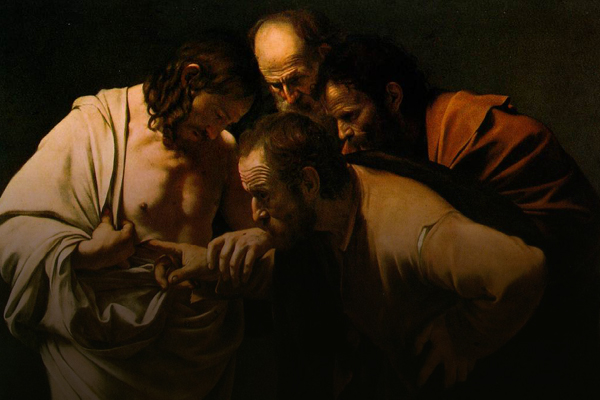
After eight days His disciples were again inside, and Thomas with them. Jesus came, the doors having been [f]shut, and stood in their midst and said, “Peace be with you.” Then He said to Thomas, “Reach here with your finger, and see My hands; and reach here your hand and put it into My side; and do not be unbelieving, but believing.” Thomas answered and said to Him, “My Lord and my God!” Jesus said to him, “Because you have seen Me, have you believed? Blessed are they who did not see, and yet believed.” (John 20:26-29)
Without any other context to understand what Jesus believed about the relationship between evidence and faith, this single sentence (“Blessed are they who did not see, and yet believed”) does sound like an endorsement of faith independent of evidential support. But context changes everything. Like other declarations offered by Jesus, this statement has to be reconciled with everything else Jesus said and did before we can truly understand what He believed about the role of evidence.
As it turns out, the Apostle John wrote more about Jesus’ evidential approach than any other Gospel author. According to John, Jesus repeatedly offered the evidence of His miracles to verify his identity and told His observers that this evidence was sufficient:
“Believe me when I say that I am in the Father and the Father is in me; or at least believe on the evidence of the miracles themselves.” (John 14:11)
“If I do not do the works of My Father, do not believe Me; but if I do them, though you do not believe Me, believe the works, so that you may know and understand that the Father is in Me, and I in the Father.” (John 10:37-38)
“…the works which the Father has given Me to accomplish, the very works that I do, testify about Me,
that the Father has sent Me.” (John 5:36)
John frequently described Jesus as someone who offered the evidence of his miraculous power to demonstrate His Deity. In fact, the passage describing Thomas’ doubt is also an affirmation of an evidential faith, if it is read in its entirety:
But Thomas, one of the twelve, called Didymus, was not with them when Jesus came. So the other disciples were saying to him, “We have seen the Lord!” But he said to them, “Unless I see in His hands the imprint of the nails, and put my finger into the place of the nails, and put my hand into His side, I will not believe.” After eight days His disciples were again inside, and Thomas with them. Jesus came, the doors having been shut, and stood in their midst and said, “Peace be with you.” Then He said to Thomas, “Reach here with your finger, and see My hands; and reach here your hand and put it into My side; and do not be unbelieving, but believing.” Thomas answered and said to Him, “My Lord and my God!” Jesus *said to him, “Because you have seen Me, have you believed? Blessed are they who did not see, and yet believed.” Therefore many other signs Jesus also performed in the presence of the disciples, which are not written in this book; but these have been written so that you may believe that Jesus is the Christ, the Son of God; and that believing you may have life in His name. (John 20:25-31)
John makes an important statement right after the line that is typically offered to “demonstrate” Jesus’ alleged affirmation of a non-evidential faith: “Therefore many other signs Jesus also performed in the presence of the disciples…” What? Blessed are those who did not see and yet believed, therefore many other signs Jesus also performed in the presence of the disciples? Do you see the contradiction here? Why would Jesus continue to provide evidence if those who believe without evidence are supposed to be blessed? The answer is found, once again, in the Gospel of John. In Jesus’ famous prayer to the Father, he prayed for unity and He carefully included those of us who would become Christians long after Jesus ascended into Heaven:
“I do not ask on behalf of these (the disciples) alone, but for those also who believe in Me through their word; that they may all be one; even as You, Father, are in Me and I in You, that they also may be in Us, so that the world may believe that You sent Me.” (John 17:20-21)
Jesus is talking here about all the people (like you and me) who will believe in Jesus not because of what we will see with our own eyes but because of what the disciples saw and recorded as eyewitnesses (“their word”). Yes, Thomas was blessed to believe on the basis of what he saw, but how much more blessed are those who will someday believe, not on the basis of what they will see, but on the basis of what the disciples saw and faithfully recorded. Jesus understood the value of evidence and continually provided “many convincing proofs” (Acts 1:2-3) to His followers so they could record their observations and change the world with their testimony. Jesus commended this process; His words to Thomas were not an affirmation of “blind faith”.

J. Warner Wallace is a Dateline featured Cold-Case Detective, Senior Fellow at the Colson Center for Christian Worldview, Adj. Professor of Christian Apologetics at Talbot School of Theology, Biola University, author of Cold-Case Christianity, God’s Crime Scene, and Forensic Faith, and creator of the Case Makers Academy for kids.
Subscribe to J. Warner’s Daily Email
Save
Save
J. Warner Wallace is a Dateline featured cold-case homicide detective, popular national speaker and best-selling author. He continues to consult on cold-case investigations while serving as a Senior Fellow at the Colson Center for Christian Worldview. He is also an Adj. Professor of Christian Apologetics at Talbot School of Theology, Biola University, and a faculty member at Summit Ministries. He holds a BA in Design (from CSULB), an MA in Architecture (from UCLA), and an MA in Theological Studies (from Gateway Seminary).

































Pingback: Reasonable Atheists and Reasonable Believers Are Targeting the Same Group | Cold Case Christianity
Pingback: The Reasonable, Evidential Nature of Christian Faith - Cross Examined - Christian Apologetics | Frank Turek
Pingback: The Reasonable, Evidential Nature of Christian Faith | Apologetics ForumApologetics Forum
Pingback: Why It’s Important to Ask the Right Questions as a Religious Seeker | Cold Case Christianity
Pingback: The Reasonable, Evidential Nature of Christian Faith - Saving Our Future
Pingback: Science, scepticism, doubts and beliefs | Stepping Toes
Pingback: Reasonable Atheists and Reasonable Believers Are Targeting the Same Group
Pingback: Jan 27, 2014 « Signs and Seasons, Days and Years
Pingback: May 6, 2013 « Signs and Seasons, Days and Years
Pingback: The Reasonable, Evidential Nature of Christian Faith | Cold Case Christianity
Pingback: Can You Trust Christianity is True If You Haven’t Examined the Alternatives? | Anchor Apologetics – Best Answers in Christianity
Pingback: Did Jesus Commend Faith That Is Blind? | TLG Christian News
Pingback: What is Your Basis for Doctrine? | The Wild Frontier
Pingback: The Reasonable, Evidential Nature of Christian Faith | J Warner Wallace – Reasoned Cases for Christ
Pingback: What kind of Christian are you? A lesson from the parable of the sower | Christian Valour